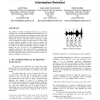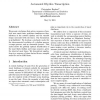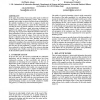137
click to vote
ISMIR
2001
Springer
15 years 7 months ago
2001
Springer
Musical genres are categorical descriptions that are used to describe music. They are commonly used to structure the increasing amounts of music available in digital form on the W...
120
click to vote
ISMIR
2001
Springer
15 years 7 months ago
2001
Springer
Musical works form a key entity for music information retrieval. Explicit linkage of relationships among entities is critical for document-based information retrieval. Works conta...
105
click to vote
ISMIR
2001
Springer
15 years 7 months ago
2001
Springer
The problem of Music Information Retrieval can often be formalized as “searching for multidimensional trajectories”. It is well known that string-matching techniques provide r...
135
click to vote
ISMIR
2001
Springer
15 years 7 months ago
2001
Springer
We present a technique that, given a sequence of musical note onset times, performs simultaneous identi cation of the notated rhythm and the variable tempo associated with the tim...
128
click to vote
ISMIR
2001
Springer
15 years 7 months ago
2001
Springer
In this paper, the problem of processing audio signals is addressed in the context of query-by-humming systems. Since singing is naturally used as input, we aim to develop a front...
109
click to vote
ISMIR
2001
Springer
15 years 7 months ago
2001
Springer
: Music title identification is a key ingredient of contentbased electronic music distribution. Because of the lack of standards in music identification – or the lack of enforcem...
112
click to vote
ISMIR
2001
Springer
15 years 7 months ago
2001
Springer
Among other factors, high complexity and mandatory expert computer knowledge make many music IR and music analysis systems unsuitable for the majority of largely computer-illitera...
112
click to vote
ISMIR
2001
Springer
15 years 7 months ago
2001
Springer
We have created a system that identifies musical keywords or themes. The system searches for all patterns composed of melodic (intervallic for our purposes) repetition in a piece....
119
click to vote
ISMIR
2001
Springer
15 years 7 months ago
2001
Springer
Musical databases are growing in number, size, and complexity, and they are becoming increasingly relevant for a broad range of academic as well as commercial applications. The fe...
114
click to vote
ISMIR
2001
Springer
15 years 7 months ago
2001
Springer
In recent years the interest in melodic similarity has mushroomed mainly due to the increased importance of music information retrieval (MIR). A great number of similarity models ...



